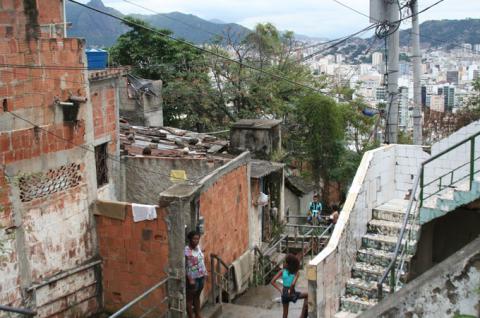Rio de Janeiro, Brazil - Days before the 2014 FIFA World Cup kicks off in Sao Paulo, another championship is set to take place in Rio de Janeiro's historic Port region.
The players aren't world-famous. Rather, they're men and women of all ages from Rio's many favelas, poor communities that surround the city.
La Copa Popular, or the People's Cup, is hosted by the activist group People's Committee of the World Cup and Olympics and is in its second year.
The qualifying tournament for this year's Copa Popular finals took place at the top of the Morro do Salgueiro favela in northern Rio, and the finals will be held on June 8.
A football field crowns the steep, winding hill at the top of the favela, covered in endless layers of housing. Dozens of young football players, local onlookers and members of the media gathered to watch eight teams battle it out.
World Cup for whom?
Larissa Lacerda of Sao Paulo, wearing a "World Cup for Whom?" T-shirt, helped organise the event. "The idea is make a sports competition, which truly has a popular character, with people in some way affected by FIFA's Cup," she said.
The FIFA World Cup general law, passed by Brazil's congress in 2012, restricted local street vendors from selling their wares within a two-kilometre radius of FIFA's restricted zones. These zones are heavily militarised by local security forces.
Opponents of FIFA, such as the People's Committee, said preparations for the Cup have also led the government to evict residents from their homes in exchange for commercial development and increasing real-estate values.
"So there are teams of communities suffering from removals, the street vendors, teams from communities suffering police violence. So we did the Cup to bring visibility to these issues and create debate," Lacerda said.
The idea wasn't new. The Poor People's World Cup was played in South Africa in 2010, in response to the 2010 FIFA World Cup held in the same country. Similarly, the alternative games in South Africa were organised to protest evictions, removals, and the barring of local venders from designated FIFA areas.
Joyce is a 15-year-old striker from the girl's qualifying team. It's her first year in the tournament, and her team is on a winning streak. It qualified as one of six teams playing for the People's Cup finals on June 8.
"A lot of people are suffering because of the World Cup. This is a way to protest," Joyce told Al Jazeera. "There are a lot of people losing their homes. Health and education are chaotic. They are wasting money on unnecessary things like more roads, when really health and education should be in first place."
Even so, Joyce plans to watch the World Cup on TV.
She lives in the same neighbourhood as the famous Maracana football stadium, but she won't see a game because ticket prices have risen beyond her budget. Neither she nor the people living in her community can afford to go. "I'm going to root despite all the problems - it's the government that is at fault, and it's something to debate with them," she said. "I don't think the players have anything to do with it."
The government released a document to journalists showing that it spent 100 times as much money on education as on FIFA stadiums. The state has spent 18bn reals ($8bn) on infrastructure projects like roads and transportation, but estimated an immediate return of 30bn reals ($13bn) from the World Cup, plus additional revenue from tourism.
Brazilian law already bars local vendors from selling near stadiums. The government has denied forcibly evicting families from their homes without due process, or for the sole purpose of infrastructure projects related to the World Cup and Olympics.
Fighting to remain
Activists dispute the government's claims. Maria do Socorro, a co-organiser and resident of a favela named Indiana, has had to fight to keep her three-story house where she has lived since she was six years old.
Indiana was among a group of favelas slated by the city government for removals in 2010, according to local reports.
"I don't want to live anywhere else," she told Al Jazeera. "When they knocked down the first houses, it was in the middle of our community. It was terrible for us, we suffered."
The public defender's office reportedly issued an injunction to stop the demolitions in 2012, and that is when the city government stopped moving residents who wanted an upgrade into new apartments.
The series of events caused division in her community and turned neighbour against neighbour.
While hundreds fight to remain, others are waiting for better living conditions from the government.
"For those who want to leave, they think I'm a person who's stopping them. But I'm not, I'm fighting because I don't want to leave," Socorro said.
"I don't have any pleasure sitting and watching Brazil play when I know that I have to struggle not to get thrown out of my house."
Follow Elizabeth Gorman on Twitter: @Eliza19


Spread the word